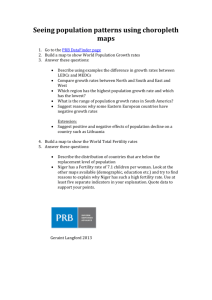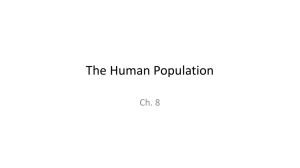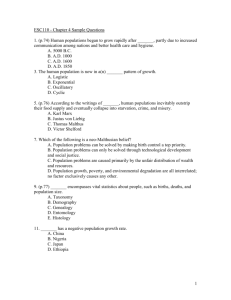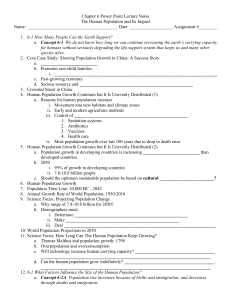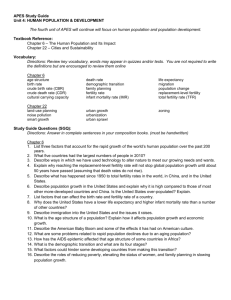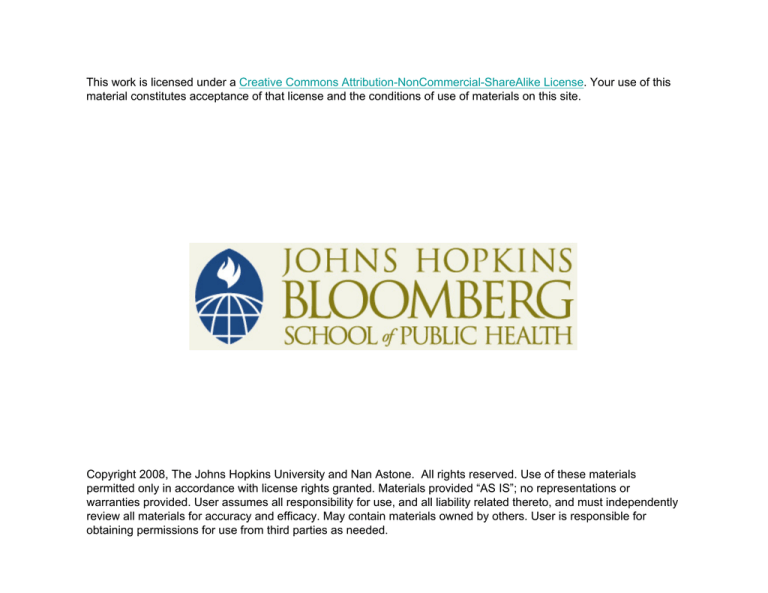
This work is licensed under a Creative Commons Attribution-NonCommercial-ShareAlike License. Your use of this
material constitutes acceptance of that license and the conditions of use of materials on this site.
Copyright 2008, The Johns Hopkins University and Nan Astone. All rights reserved. Use of these materials
permitted only in accordance with license rights granted. Materials provided “AS IS”; no representations or
warranties provided. User assumes all responsibility for use, and all liability related thereto, and must independently
review all materials for accuracy and efficacy. May contain materials owned by others. User is responsible for
obtaining permissions for use from third parties as needed.
Session 3
Theories of Fertility Decline
Social and Economic Aspects of Fertility Decline
Population, Family and Reproductive Health
380.655
AY 2008-2009
Objectives of the Lecture
• At the end of this lecture and the accompanying reading
students will be able to:
– Describe recent trends in fertility world wide
– Define Demographic Transition Theory
– Describe the measures developed by and the
substantive findings from the European Historical
Fertility Project
– Define Ideational Theory
– Define Economic Theories of Fertility Decline
– Define Homeostatic Theory of Fertility
Objectives of the Lecture
• At the end of this lecture and the accompanying reading
students will be able to:
– Describe recent trends in fertility world wide
– Define Demographic Transition Theory
– Describe the measures developed by and the
substantive findings from the European Historical
Fertility Project
– Define Ideational Theory
– Define Economic Theories of Fertility Decline
– Define Homeostatic Theory of Fertility
Fertility has declined virtually everywhere
Not the same pattern or degree of decline everywhere
Objectives of the Lecture
• At the end of this lecture and the accompanying reading
students will be able to:
– Describe recent trends in fertility world wide
– Define Demographic Transition Theory
– Describe the measures developed by and the
substantive findings from the European Historical
Fertility Project
– Define Ideational Theory
– Define Economic Theories of Fertility Decline
– Define Homeostatic Theory of Fertility
Modernization Theory
• A body of scholarship that developed over the
1950s and 1960s to guide understanding about
the process of economic development
– Assumed that less developed countries would
eventually look like Europe and the U.S.
– Assumed that social and cultural institutions in
Europe and the U.S. before economic development
looked like those found in developing world at the
time
Changes that would accompany economic
development
• Family Change
– From extended households to nuclear households
• Assumed that in historical Europe people had lived
in extended households
– From high fertility to low fertility
• Assumed that in historical Europe fertility rates
were as high as those observed
Demographic Transition Theory
• Commonly called DTT
• Decline of Mortality due to increasing living
standards (nutrition and sanitation) and medical
advances)
• Industrial Economy not compatible with large
families
• Decline of Fertility will follow as the night the day
• In order to have fertility decline, one must have
economic development
DTT Theorists were Modernization Theorists
• Fertility Decline and family change only one of a plethora
of outcomes they were interested in
• Sideline, really
• Modernization Theory reached its heyday before
concern about rapid population growth
Rapid Population Growth
• From Paul Erlich’s The Population Bomb (1969)
– "The battle to feed all of humanity is over. In the
1970s and 1980s hundreds of millions of people will
starve to death in spite of any crash programs
embarked upon now. At this late date nothing can
prevent a substantial increase in the world death
rate..."
Part of the Panic was because of DTT
• If mortality decline and economic development
are necessary pre-cursors to fertility decline,
then world catastrophe is unavoidable
• Scientists set out to discover what aspects of
economic development promote fertility decline
in order to hurry it along
– Fertility decline became the main focus
Objectives of the Lecture
• At the end of this lecture and the accompanying reading
students will be able to:
– Describe recent trends in fertility world wide
– Define Demographic Transition Theory
– Describe the measures developed by and the
substantive findings from the European Historical
Fertility Project
– Define Ideational Theory
– Define Economic Theories of Fertility Decline
– Define Homeostatic Theory of Fertility
European Historical Fertility Project
• Collected Data on Fertility for province (county) sized
areas in Europe as far back as they could
• Hypothesized links between levels of economic
development (measured various ways) and the onset of
fertility decline
Major Method was reconstitution
• Linked baptismal, marriage and burial records from
parish registers
• Province level units of geography
• http://members.tripod.com/tormartonglos/dyrhamhintonbaptisms.htm
Developed New Measures
• calculated using information from the vital registration
systems and from census distributions of the female
population by age and marital status;
• the same type of data and the same procedures were
used to calculate the indexes for each province at each
date (usually at 10-year intervals);
• where it was considered necessary to correct the data
for omissions or inaccuracies, this was done.
Developed New Measures
If
the ratio of the births the women in a given population
actually have to the number they would have if subject to
a maximal well-recorded age-specific fertility schedule
(that of the Hutterites).
•
•
Developed New Measures
•
•
Ig
the ratio of the births the married women in a given
population actually have to the number they would have
if subject to the maximal age-specific fertility schedule.
Developed New Measures
•
•
Im
the ratio of the number of births married women would
experience if subject to the maximal age-specific fertility
schedule to the number of births all women would
experience if subject to that same maximal fertility
schedule. This is an index of the extent to which the
marital status distribution would contribute to the
attainment of maximal fertility in a population in which all
births were to marrried women.
Developed New Measures
Ih
the ratio of the births the unmarried women in a given
population actually have to the number they would have
if subject to the maximal age-specific fertility schedule.
•
•
Developed New Measures
The indices have the following relationship:
If = Im x Ig + (1.0 - Im) x Ih
Results
• In Europe, overall fertility fluctuated a great deal, but
marital fertility fluctuated very little
Results
• Fertility decline began at very different levels of
development
• Very weak, if any, confirmation of DTT
• The onset of fertility decline followed cultural and
particularly linguistic lines
– Belgium and Spain
Results for Spain
• Table following:
– East declined the most (French influence)
– South declined next, but was most backward
– Center declined steadily, lowest to begin with
– North stalled
Objectives of the Lecture
• At the end of this lecture and the accompanying reading
students will be able to:
– Describe recent trends in fertility world wide
– Define Demographic Transition Theory
– Describe the measures developed by and the
substantive findings from the European Historical
Fertility Project
– Define Ideational Theory
– Define Economic Theories of Fertility Decline
– Define Homeostatic Theory of Fertility
Ideational Theory
• Ideas about ideal family size and birth control practices
spread more quickly in culturally homogeneous
populations (weak)
• All people want to control family size, they just don’t
know how, once somebody figures it out, the idea will
spread like wildfire (strong)
Timing was serendipitous
• Ideational Theory emerged at roughly the same time as
concern with rapid population growth
• Arguments began to develop that perhaps the observed
correlation between economic development and fertility
was due to economic development requiring fertility
decline in order to move forward
Ideational Theory
• Scientific Rationale for the efficacy of family planning
programs
• Theory (perhaps not the theorists) is agnostic on the
threat posed by rapid population growth or population
decline
Objectives of the Lecture
• At the end of this lecture and the accompanying reading
students will be able to:
– Describe recent trends in fertility world wide
– Define Demographic Transition Theory
– Describe the measures developed by and the
substantive findings from the European Historical
Fertility Project
– Define Ideational Theory
– Define Economic Theories of Fertility Decline
– Define Homeostatic Theory of Fertility
Economic Models of Fertility Decline
• Supply and Demand
– “demand” for children (ideal family size)
– “supply” of children (ability to control fertility)
Economic Models of Fertility Decline
• Demand for Children
– Transition from agriculture to industry changes
demand from “quantity” to “quality”
– Associated with Gary Becker
Economic Models of Fertility Decline
• supply of children is the ability to control fertility
– Fecundity
– Price of birth control (psychic and pecuniary)
• Pre-natal, internatal, and post-natal birth control
Objectives of the Lecture
• At the end of this lecture and the accompanying reading
students will be able to:
– Describe recent trends in fertility world wide
– Define Demographic Transition Theory
– Describe the measures developed by and the
substantive findings from the European Historical
Fertility Project
– Define Ideational Theory
– Define Economic Theories of Fertility Decline
– Define Homeostatic Theory of Fertility
Homeostatic Models
• Taken in the long view, rather than the short view
– Question IS NOT “Why fertility declines?”
– Question IS “How do people adjust to declining
mortality?”
Homeostatic Models
• Hirschman and Wilson/Airey
– Emphasize historical demography from non-European
Settings
• China, very early, arranged marriage
• Japan, infanticide and divorce
• In all Asia, sex composition of sibling sets
important reproductive goal
– Suggests that people aware of fertility limiting effects
of behavior, reproductive goals consistent with
replacement fertility under conditions of very high
mortality
Objectives of the Lecture
• At the end of this lecture and the accompanying reading
students will be able to:
– Describe recent trends in fertility world wide
– Define Demographic Transition Theory
– Describe the measures developed by and the
substantive findings from the European Historical
Fertility Project
– Define Ideational Theory
– Define Economic Theories of Fertility Decline
– Define Homeostatic Theory of Fertility

